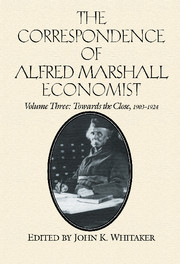Book contents
- Frontmatter
- Contents
- Introduction
- Abbreviations
- List of Manuscript Collections
- Biographical Register
- Chronology 1903-1924
- List of Letters Reproduced in Volume 3
- LETTERS 733–940
- LETTERS 941–1148
- Appendix I Reports of Marshall's Speeches to the Cambridge University Senate 1903–1908
- Appendix II Comprehensive Listing of Archival Sources for Volumes 1, 2, and 3
- Index of Letters by Correspondent
- Index of Persons
- Subject Index
Appendix I - Reports of Marshall's Speeches to the Cambridge University Senate 1903–1908
Published online by Cambridge University Press: 06 July 2010
- Frontmatter
- Contents
- Introduction
- Abbreviations
- List of Manuscript Collections
- Biographical Register
- Chronology 1903-1924
- List of Letters Reproduced in Volume 3
- LETTERS 733–940
- LETTERS 941–1148
- Appendix I Reports of Marshall's Speeches to the Cambridge University Senate 1903–1908
- Appendix II Comprehensive Listing of Archival Sources for Volumes 1, 2, and 3
- Index of Letters by Correspondent
- Index of Persons
- Subject Index
Summary
Discussion of Report of the Economics Syndicate, 7 May 1903
Prof. Marshall said that he would like to add one suggestion to the admirable remarks which Mr Dickinson had made. It was that the Historical Tripos as at present constituted was an almost exclusively English Historical Tripos, especially on its economic side. That was because it had been found that in three years a student could not trace the detailed history over eight centuries of more than one country: any glances he might take at other countries must be hasty: and his studies were cut short for want of access to secret documents just about the time when the electric telegraph and other modern means of communication were leading up to the economic conditions of our own time. Economically the western world was now a single organism: so that no nation could understand its own economic problems without constant reference to the recent and contemporary international history of other countries. Recent international history was absolutely essential to the economist, and that was not represented at all in the Historical Tripos.
It was almost impossible to overrate the value of Historical Studies as an end in themselves. He hoped and believed that they would attract, as time went on, a largely increasing part of the best intellect of the world. But history to the economist was a means towards his ends, and they must consider what his ends were.
- Type
- Chapter
- Information
- The Correspondence of Alfred Marshall, Economist , pp. 398 - 405Publisher: Cambridge University PressPrint publication year: 1996
- 1
- Cited by



